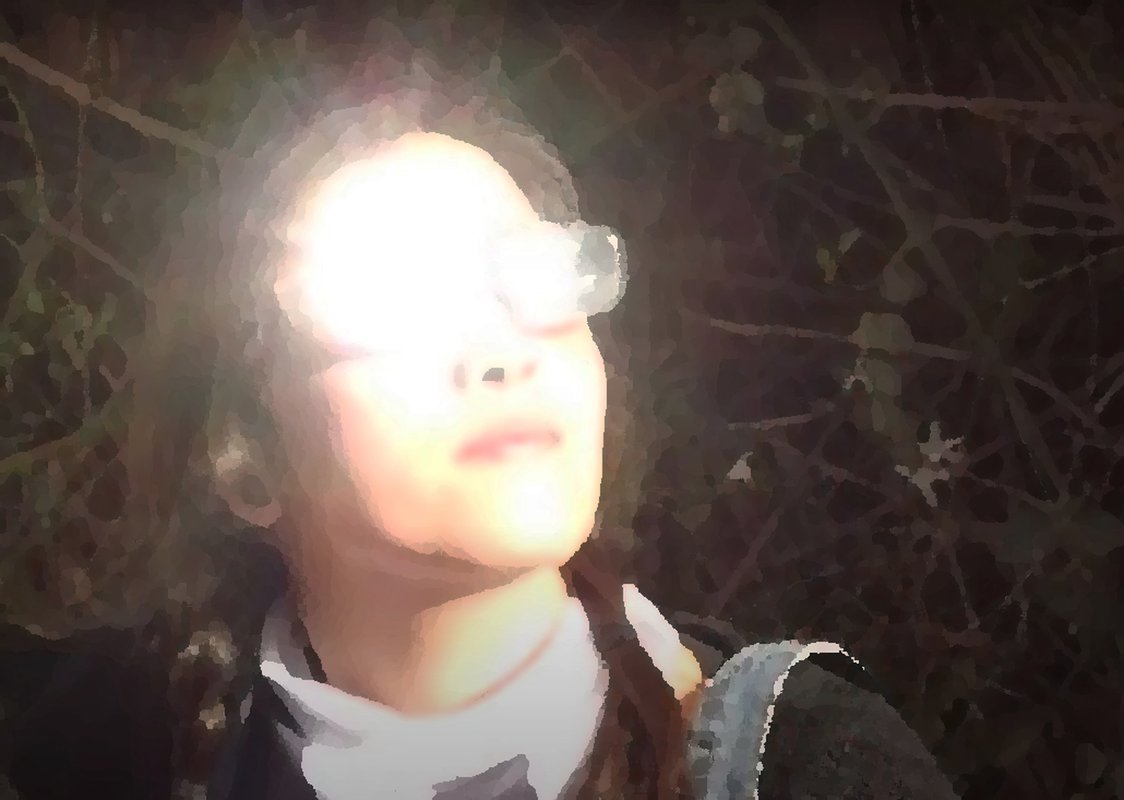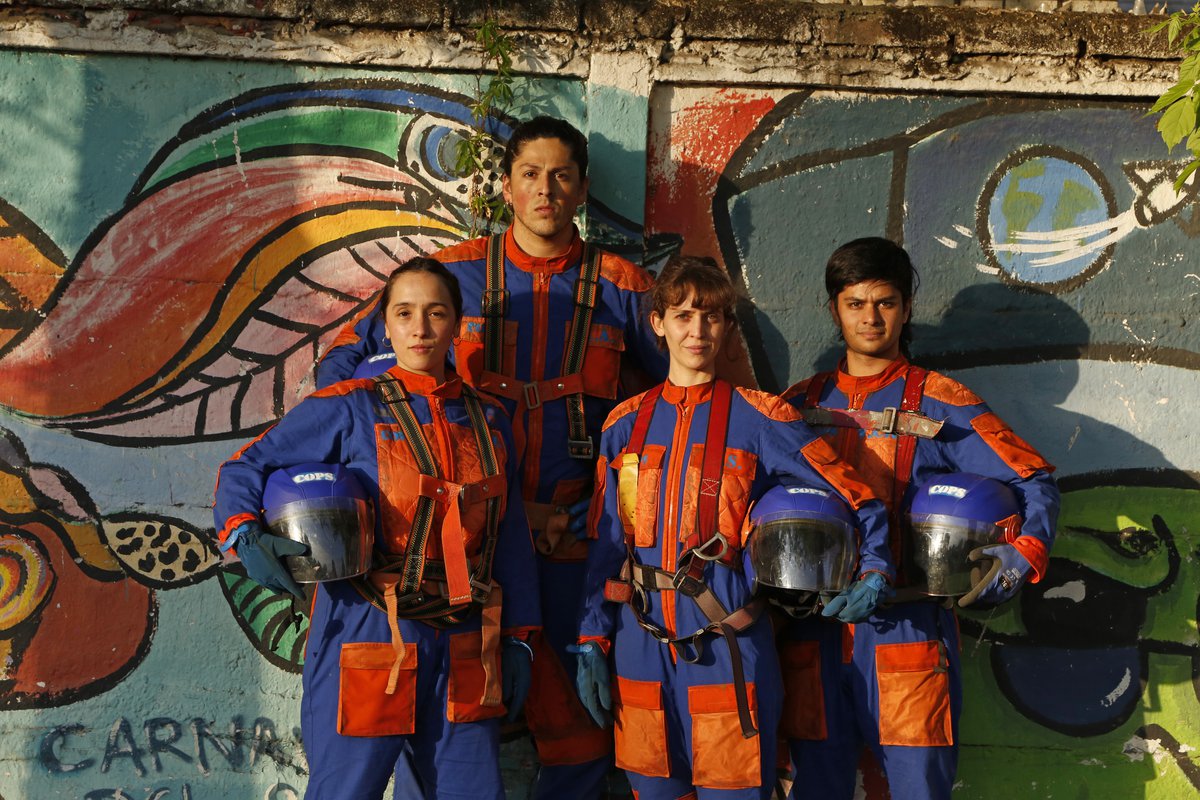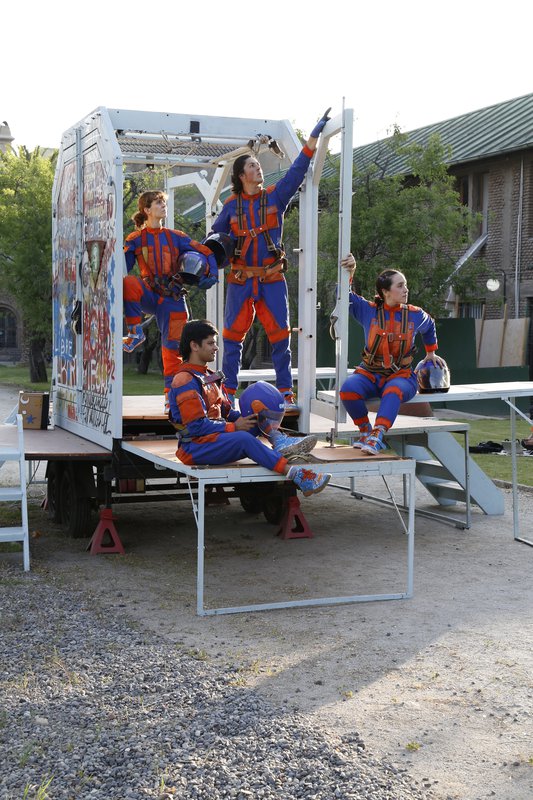Teatro familiar
Written by: Colectivo Obras Públicas | Directed by: Claudia Echenique | Cast: Sofía Zagal, Gabriel Contreras, César Avendaño, Constanza González, Benjamín del Río and Vicente Christian | Musical score: Sofía Zagal and Benjamín del Río | Astronomy consultant: Olemma Leyton | Theatrical consultant: Jonathan Aravena.
Claudia Echenique Saavedra
Director
From the stage to the streets
In 1995, this actress and theater director built the Teatro Móvil Magdalena with designer Herbert Jonckers, which toured Chile with its trilogy Ofelia y su mágico teatro móvil (1996), an adaptation of the story by Michael Ende; La tierra anterior (1999) by Patricia Araya and Nagy, el habitante del cielo (2005) by Jaime Collyer. She’s currently a part of Internacional Invenciones, a collaborative project by Violenta Raza with the Boa Companhia and Matula Teatro. Their first play, Mujeres Violentas, was premiered in Brazil in 2011. She has also made a name for herself as an indoor theater director with plays like Cariño Malo (1990), Malinche (1993), Sidhartha (1995), ART (1999) and Proof (2003) at the Catholic University Theater, where she teaches classical, contemporary and street theater and theater directing.
Colectivo Obras Públicas
Colectivo Obras Públicas
Construction carried out here
Created in 2010 by Catholic University graduates, the group is directed by Claudia Echenique with the aim of constructing a creative theatrical style that can be used to tackle social issues. They’ve put on five plays: Clotario (2011), Brigadas (2012), Constitución (2014), Ubú RóK (2015) and Menores (2017). In 2018, LOM Ediciones published their book Trilogía Ciudadana: de la calle al libro, bringing together the scripts from their first three plays, as well as musical scores and articles about their creative process.
—Claudia Echenique - who has worked with the Shakespeare & CO company on different plays by the English playwright, including Macbeth, Ricardo III, Tito Andrónico, Sueño de una noche de verano, La Tempestad and Perfoconferencia: Shakespeare – is the director. “Getting to know Shakespeare and his work is essential to understanding the crisis that contemporary humankind is going through, as well as human rights, love and all the axes on which the world turns”, she said in 2017 in an interview with the Teatro a Mil Foundation.
—It introduces us to the Teatro Móvil Magdalena, a large-scale theatrical prop in the shape of a metallic cube, created by designer Herbert Jonckers. During the play, it becomes, in turn, a boat, library or a hill; at the same time, it can be transported to different parts of the country.
Street theater: A form of theater that is held outside in public, where the audience doesn’t pay to watch the show and normally comes across it by chance. It dates back to ancient Greece around the VI century A.C. In modern times, it was revived as a result of a downturn in conventional theater venues, looking to appeal to an audience that didn’t go to the theater in an act of socio-political rebellion. This ideological aspect meant that, during the first half of the twentieth century, it was associated with the working-class. From the sixties onwards, it gradually became more esthetic than political and, in the nineties, it started to incorporate more lighting, sound and special effects. One of the companies crucial to its revival was the North American company Living Theater that, for its part, was influential in independent and experimental theater.
Herbert Jonckers: This Belgian set designer and designer was born in Brussels in 1953. He settled in Chile in 1982, working with Chilean creator Ramón Griffero to put the concept of the ‘dramaturgy of space’ into practice. He has won several awards from critics for his work in theater, at the same time as maintaining an important career that has seen him involved in art, graphics, TV directing and university teaching.
More information
—Take a look at Claudia Echenique’s interview with the Argentine Shakespeare Foundation and the author’s approach to Ricardo III and Macbeth, including the challenge of bringing them to the streets.
—Watch the TVN report about the performances of the play Brigadas in the Pedro Aguirre Cerda neighborhood during Santiago a Mil 2013.
On Instagram, @copsteatro
On Facebook, ColectivoObrasPublicas




Estrellar
By Colectivo Obras Públicas | Directed by Claudia Echenique
- Chile
- Spanish
- 60 minutes
- +10 years
While the country’s attention seems to be focused exclusively on worldly issues, this street theater piece reminds us that looking to the skies can help both transform the present and build a new one.
Estrellar is street theater that includes different stories connecting us with the universe and its mysteries. The crew of the car-ship Magdalena travel through different neighborhoods, inviting the public to look to the sky and, as a result, to the memory of the moments that connect us to our past. They decide to set off on an interstellar journey, in spite of the lack of support for technological development in our country.
This theatrical creation aims to help develop citizens’ abstract thought by dealing with content linked to the universe and its relevance to our everyday lives. At the same time, it aims to highlight the importance of the Santiago sky as a doorway to the universe.

Written by: Colectivo Obras Públicas | Directed by: Claudia Echenique | Cast: Sofía Zagal, Gabriel Contreras, César Avendaño, Constanza González, Benjamín del Río and Vicente Christian | Musical score: Sofía Zagal and Benjamín del Río | Astronomy consultant: Olemma Leyton | Theatrical consultant: Jonathan Aravena.
Claudia Echenique Saavedra
Director
From the stage to the streets
In 1995, this actress and theater director built the Teatro Móvil Magdalena with designer Herbert Jonckers, which toured Chile with its trilogy Ofelia y su mágico teatro móvil (1996), an adaptation of the story by Michael Ende; La tierra anterior (1999) by Patricia Araya and Nagy, el habitante del cielo (2005) by Jaime Collyer. She’s currently a part of Internacional Invenciones, a collaborative project by Violenta Raza with the Boa Companhia and Matula Teatro. Their first play, Mujeres Violentas, was premiered in Brazil in 2011. She has also made a name for herself as an indoor theater director with plays like Cariño Malo (1990), Malinche (1993), Sidhartha (1995), ART (1999) and Proof (2003) at the Catholic University Theater, where she teaches classical, contemporary and street theater and theater directing.
Colectivo Obras Públicas
Colectivo Obras Públicas
Construction carried out here
Created in 2010 by Catholic University graduates, the group is directed by Claudia Echenique with the aim of constructing a creative theatrical style that can be used to tackle social issues. They’ve put on five plays: Clotario (2011), Brigadas (2012), Constitución (2014), Ubú RóK (2015) and Menores (2017). In 2018, LOM Ediciones published their book Trilogía Ciudadana: de la calle al libro, bringing together the scripts from their first three plays, as well as musical scores and articles about their creative process.
—Por la dirección de Claudia Echenique, quien ha trabajado junto a la compañía Shakespeare & CO diversas obras del dramaturgo inglés, como Macbeth, Ricardo III, Tito Andrónico, Sueño de una noche de verano, La Tempestad y Perfoconferencia: Shakespeare. “Conocer a Shakespeare y su obra se vuelve un acto necesario para comprender la crisis del hombre contemporáneo, los derechos humanos, el amor y todos los ejes movilizadores de la humanidad”, dijo en 2017 en entrevista a Fundación Teatro a Mil.
—Porque se presenta en el Teatro Móvil Magdalena, dispositivo escénico de grandes proporciones con forma de cubo metálico creado por el diseñador Herbert Jonckers, el que, durante la obra, se transforma en nave, biblioteca, cerro, etc. Y a su vez permite ser remolcado por distintos puntos del país.
Teatro Callejero o de calle: Forma de representación teatral que se desarrolla en espacios públicos abiertos, donde los espectadores no pagan por asistir al espectáculo y comúnmente se encuentran con él de manera espontánea. Tiene sus orígenes en la antigua Grecia hacia el siglo VI a.C. En su etapa moderna nació del rechazo a los recintos teatrales convencionales y la búsqueda de un público que no frecuenta el teatro, como acción sociopolítica directa. Ese valor ideológico original hizo que durante la primera mitad del siglo XX se asociara al teatro proletario. A partir de los 60, se inclinó progresivamente hacia objetivos más estéticos que políticos, y en los 90 se incorporan mayores efectos de iluminación, sonido y efectos especiales. Uno de sus renovadores fue la compañía norteamericana Living Theater, que influiría a su vez en el teatro independiente y experimental.
Herbert Jonckers: Este escenógrafo y diseñador belga nació en Bruselas en 1953. Se estableció en Chile en 1982, como parte de su trabajo junto al creador nacional Ramón Griffero, encargándose de llevar a la práctica el concepto de Dramaturgia del Espacio. Ganó varios premios de la crítica por su trabajo teatral, que desarrolló a la par de una valiosa carrera que incursionó en el arte, la gráfica, la dirección de TV y la docencia universitaria.
—Revisa la entrevista que dio Claudia Echenique a la Fundación Shakespeare Argentina sobre su acercamiento al autor de Ricardo III y Macbeth, y el desafío de llevarlo a teatro de calle.
—Ve la nota de TVN sobre las funciones de la obra Brigadas en la comuna Pedro Aguirre Cerda durante Santiago a Mil 2013.
En Instagram, @copsteatro
En Facebook, ColectivoObrasPublicas
COLABORA








